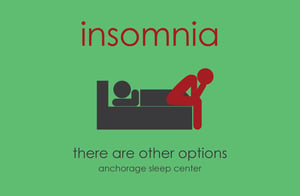Why Darkness Hurts Sleep
Alaskan winters mean daily darkness for most or all of the day. The extreme lighting condition of Alaska, especially as you go north, affects our lives in many different and important ways:
- Psychologically
- Physiologically
- Habitually
- Emotionally
- Sociologically
While we generally associate darkness with sleep, endless darkness is actually bad for sleep. This is due to the fact that melatonin, the hormone that regulates sleep, is light sensitive, and either increased production in changes from light to dark, or decreases production in changes from dark to light.
Lacking any kind of change in light, the extreme darkness can cause poor melatonin regulation and result in sleeping disorders (or the exacerbation of existing ones) in many people. Winter sleeping disorders that are most common in Alaska include:
- Insomnia
- Circadian Rhythm disorders
- Restless leg syndrome (RLS)
What Is Insomnia?
Insomnia is the persistent feeling that you cannot:
- Fall asleep
- Stay asleep throughout the night
- Sleep until morning, such as you wake up much earlier than you want/need
In the case of Alaskans, insomnia tends to be:
- Chronic – it is a problem most night and lasts more than a month
- Primary – the cause of insomnia has a clear cause (lack of light cues), as opposed to Secondary which has no clear cause
 Besides those already listed other insomnia symptoms include [SleepEducation]:
Besides those already listed other insomnia symptoms include [SleepEducation]:
- Daytime sleepiness
- Fatigue
- Lack of motivation
- Problems with attention, memory, or concentration
- Concerns and frustrations related to sleep (or lack of it)
- Moodiness
- Inability to fall asleep at desired times (i.e., erratic sleep cycle)
The major concern with insomnia is severe sleep deprivation.
What is Restless Leg Syndrome?
Restless leg syndrome (RLS) is a nervous system disorder that causes uncomfortable feelings in your legs (and other extremities) during the night. RLS usually causes enough discomfort to interfere with sleep (causing sleep deprivation) and so it is considered a sleep disorder as well.
Some of the symptoms include feeling the following on your legs at night:
- Aching, throbbing, or burning
- Cramping (especially in calves)
- Jerking
- Buzzing or vibrating feelings
- Itchy feeling
- Feeling of pins and needles
- Creepy crawly feeling
- Irresistible urge to move your leg to relieve the discomfort
Like insomnia, the primary problem associated with restless leg syndrome is sleep deprivation because RLS causes you to wake up and move your leg to ease the discomfort.
What Are Circadian Rhythm Disorders
Your circadian rhythm is the same thing as your “biological sleep clock.” This biological sleep clock is a part of your brain called the suprachiasmatic nucleus of the hypothalamus, and sits right behind the nerves of your eyes.
Circadian rhythm disorders include insomnia, but also encompass any type of sleeping problem you may have, such as:
- Erratic sleep pattern
- Ever shifting biological clock
- Natural sleep/wake times that are abnormal
A good example of this is Jet Lag, which is a temporary circadian rhythm disorder that makes it difficult to sleep at “regular” times, but once asleep you don’t have trouble getting enough sleep.
Ways to Overcome Alaskan Sleep Problems
As we have mentioned in other articles, here is a list of good things to do to prevent or mitigate sleeping problems:
- Light therapy – the number one most effective technique for most people in Alaska
- No alcohol right before bed
- Limit total caffeine intake
- Limit caffeine intake after noon
- Limit liquids directly before bed
- Take a hot bath right before bed
- Take same actions before bed every evening
- Cut out blue light (TV, computers, smart phones) in the hour leading up to bed
- Using scents, such as essential oils
- Listen to the same music before bed
- Do a specific calming activity, such as meditation, washing, right before bed
- Find an activity outside you like
- Get a gym membership
- Get an at home workout series
Some sleep disorders require more than self-management to overcome. If you have tried everything, take this free online sleep test to get started in the road to better sleep in Alaskan winters.

.png?width=750&name=Sleep%20disorders%20that%20get%20worse%20in%20Alaskan%20winters%20(2).png)
